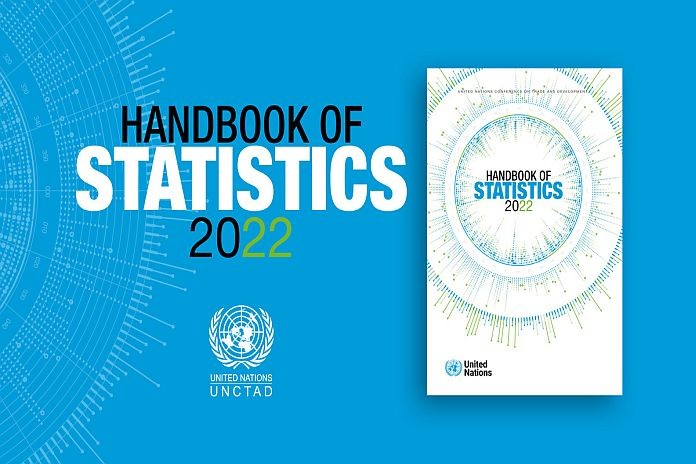GENEVA, Switzerland – UNCTAD released on 12 December the Handbook of Statistics 2022 – the global reference for trade and development trends published each year.
It provides in one report the key data and indicators on how the global economy has evolved – for regions, countries and sectors
The handbook provides projections based on real-time estimates – called nowcasts – to help governments anticipate ongoing shifts and improve policymaking.
“Timely and quality data are critical now more than ever as concurrent global crises test our resilience,” UNCTAD Secretary-General Rebeca Grynspan said. “These statistics will help countries take evidence-based policy measures to cushion the blow of the global crisis on the most vulnerable.”
Key findings
- Global economy will slow down in 2022
Growth in global real GDP will drop from 5.7 percent in 2021 to 3.3 percent in 2022.
The report shows that trade in both goods and services will slow down. Growth in merchandise exports is expected to decline by half, from the strong 26.5 percent increase recorded in 2021 to 13.8 percent this year. For services exports, which include transport and travel, the slowdown will be less pronounced – from 17.2 to 14.6 percent.
Despite the strong growth in trade in services in 2021, the value of exports ($6.1 trillion) remained below their pre-COVID-19 levels ($6.3 trillion in 2019).
- Prices soared, especially for fuels, driving inflation
The prices of primary commodities, such as food and energy, soared by 55 percent in 2021. Fuels accounted for 22 percentage points of the growth.
The upward trend continued this year, with prices hitting in August 2022 their highest levels in nearly three decades.
Inflation also soared, especially in Africa, where consumer prices jumped by 22.7 percent in 2021. Meanwhile, households in Latin America and the Caribbean saw prices rise by 15 percent.
- Trade surplus of developing economies increased
The trade surplus of developing economies grew, especially in Africa. The increase was mirrored by a widening trade deficit for developed economies.
Developing countries traded more with developed nations ($8 trillion) than among themselves ($5.4 trillion). Trade between developed nations was slightly higher at $8.5 trillion.
- Export diversification remains a challenge for developing countries
Export diversification in many developing countries remained low in 2021. Western Asia and Northern Africa had the least diversified basket of exports, followed by Oceania and Sub-Saharan Africa.
But the products that countries depended on varied across regions. Around three quarters of Africa’s exports consisted of primary goods (77%), while developing economies in Asia and Oceania exported manufactured goods in nearly equal proportions (76%).
Least developed countries fall short of growth targets
The world’s 46 least developed countries (LDCs) reported real GDP growth of only 2 percent in 2021, less than half the global average of 5.7 percent.
GDP growth in LDCs fell far short of the 7 percent annual per-capita growth target enshrined in the UN’s 2030 Agenda for Sustainable Development.
Population hits 8 billion while dependency rates increase
The global population hit 8 billion in November 2022, even though growth has been declining since the late 1980s. In 2021, it stood at 0.87 percent.
Global dependency rates also increased among the population. On average, there are 54 dependent children or older people for every 100 workers. Africa has the highest dependency ratio at 72 percent.





